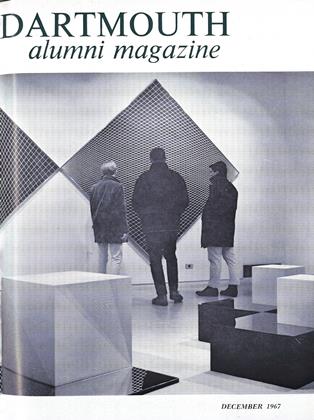To the semanticist or the musician, the name Zildjian symbolizes "cymbal." Semantically Zildjian means son of the cymbal maker; musically it represents the world leader in the manufacturing of cymbals.
ROBERT ZILDJIAN '45, together with his father Avedis and brother Armand, heads the 344-year-old company, now located in a modern North Quincy, Mass., factory. They are the only cymbal manufacturers in the United States and are responsible for the majority of the world's output.
"Family tradition dates the business back farther," Bob says, "but records date it from 1623." Then, in Constantinople, the original Avedis Zildjian discovered an ingenious method of treating alloys in the cymbal-casting process.
The secret has been passed down verbally, through an apprenticeship process, to an unbroken line of Zildjians. Bob and his family use the same method today, in a room behind double locked doors to which only the three of them have access. No competitor—or distant relative either - has ever succeeded in identifying or duplicating the when, how, and what that's involved in the heating and mixing.
Other employees - all craftsmen - work at the lathes, vats, oven and mill, at hand hammering. Harold Thompson, cymbalist with the Boston Symphony, is retained as a tester and selector. No two cymbals are alike and it takes an expert ear to marry the right contrasting pair.
Bob talks enthusiastically about their famous customers - Gene Krupa, Buddy Rich, Max Roach, Tony Williams. He's a jazz buff and keeps on the qui vive of trends and personalities. Needs and styles change and the Zildjians try to stay on top of things - from the early use of cymbals in Orthodox churches, to the emergence of Civil War martial music, to jazz and the big bands, to today's electronic music.
"Frequently, musicians can't define their needs," Bob says. "They say, 'I know what I want but I can't explain it to you.' So we have to interpret."
His musical knowledge runs the full gamut. "New symphony composers are using more cymbals," he says. "Piston, Stravinsky, Kodaly - they've all done great things for percussion. And this way-out stuff is using it even more."
He looks after the foreign markets, too, and numbers among his customers the Bolshoi Ballet, Vienna Philharmonic, Royal Opera House, and Royal Danish Ballet. So far this year he has been to Europe three times, around the world once, and to Canada - where they have another factory - about twenty times.
Zildjian cymbals - generally ranging from a ten-inch at $17 to a 22-inch at $77.50 - are sold through wholesalers and retailers, but only after they've had the proper aging at the factory. It requires a minimum of three months, but according to Bob, "A cymbal, like wine, improves the older it is. Aging mellows the tone."
"I'm a kind of frustrated historian," he admits, and on slight provocation will launch into a scholarly cymballic view of history, from the Bronze Age to the present, citing Scripture, Shakespeare, musical compositions, and museum acquisitions, among many related things.
There are boys in line, a son and nephew, to carry on the Zildjian family history and secrets. And one rule is inviolate, Bob says. "We never tell the women."
 View Full Issue
View Full Issue
More From This Issue
-
 Feature
FeatureFood for Alumni Thought
December 1967 -
 Feature
FeatureThe Dartmouth-Talladega Alliance
December 1967 By WILLIAM R. MEYER -
 Article
ArticleWith the Big Green Teams
December 1967 -
 Article
ArticleThe Undergraduate Chair
December 1967 By JOHN BURNS '68 -
 Class Notes
Class Notes1923
December 1967 By WALTER C. DODGE, DR. THEODORE R. MINER, TRUMAN T. METZEL -
 Class Notes
Class Notes1941
December 1967 By EARL H. COTTON, LOUIS A. YOUNG JR.







